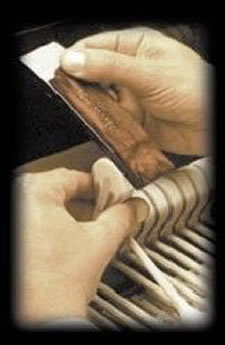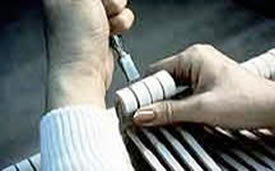What's Voicing?
 Every piano has its own distinct sound or "voice". In many ways, that's how it was built and that is its personality.
Every piano has its own distinct sound or "voice". In many ways, that's how it was built and that is its personality.
But over time, the more a piano is played, the more the hammer felt that strikes the strings wears down and compacts. This hardening can cause the tone to become too harsh or bright, and it's difficult to produce a wide or even range of expression or tone, no matter how much you try to play using dynamics.
In other situations, the piano may seem too dull or lifeless for your taste with little natural sustain. Either way, a technician can treat the hammers in various ways: by aligning, shaping, carefully needling or hardening the hammers, in order to come closer to the tone you're looking for.
Many new pianos that come from the factory with hammers that are very hard and produce overly bright and even metallic sounding notes in what would otherwise be a beautiful  instrument. This is not an accident and something that is built into many, especially oriental pianos with the intention of allowing the new owner to have the piano voiced upon purchase in a way that would please their own sound requirements.
instrument. This is not an accident and something that is built into many, especially oriental pianos with the intention of allowing the new owner to have the piano voiced upon purchase in a way that would please their own sound requirements.
Most piano owners and players are as unaware of the workings of their piano as most of us are unaware of the workings of our car. If you are not happy with the sound of your piano, a technician can guide you through a choice of treatments that will profoundly improve the range of sound and playability of any piano.
This process, called voicing, is one of the most rewarding areas in my work.